Attending the program were: Ms. Nguyen Thi Le, Deputy Secretary of the Ho Chi Minh City Party Committee and Chairwoman of the Ho Chi Minh City People's Council; Mr. Nguyen Van Dung, Vice Chairman of the Ho Chi Minh City People's Council; and leaders of the committees of the Ho Chi Minh City People's Council…
Le Truong Hai Hieu, Head of the Economic and Budget Committee of the Ho Chi Minh City People's Council, chaired the program.
Speaking at the program, voter Lam Du Cuong ( Vietjet Aviation Joint Stock Company) suggested that the Ho Chi Minh City government assess the advantages and disadvantages of applying information technology in resolving administrative procedures. He pointed out that currently, network and data transmission connections are occasionally inaccessible, and operations fail, requiring users to start over. He asked what measures Ho Chi Minh City is taking to address this issue.
Voter Hoang Duc Long (Ward 6, District 5) requested that the Ho Chi Minh City People's Committee provide an assessment of the implementation of Government Decree 06, particularly regarding remaining issues that are causing public dissatisfaction. He also suggested that Ho Chi Minh City implement solutions to computerize the handling of administrative complaints and lawsuits from citizens.
Meanwhile, Mr. Bui Huu Huy Hoang, Chairman of the People's Committee of Ward 13, District 3, raised the issue that currently, the People's Committee and police at all levels are encouraging people to use level 2 identity verification accounts. People can use their phones with the VNeID software to access these accounts wherever they go. However, people are now complaining that even with an identity verification account and VNeID software, they are still required to provide original documents in some places.
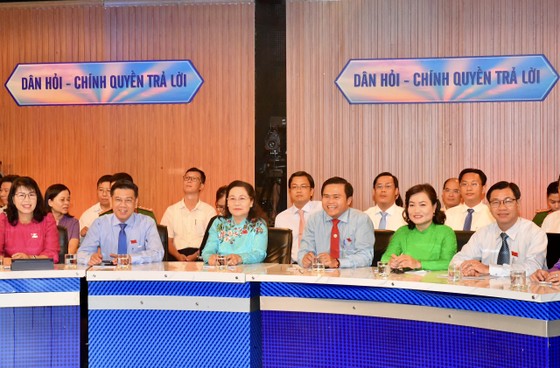 |
Chairwoman of the Ho Chi Minh City People's Council Nguyen Thi Le and other delegates of the Ho Chi Minh City People's Council attended the program. Photo: VIET DUNG |
Actively overcome technical and human resource limitations in digital transformation.
Responding to voters' concerns, the Director of the Ho Chi Minh City Department of Information and Communications, Lam Dinh Thang, stated that in recent times, the city's leaders have decisively directed the implementation of an information system for handling administrative procedures. This system was completed within just 5 months. Citizens only need to provide information once; the entire procedure is then carried out online, saving time and costs for both citizens and businesses. Furthermore, citizens and supervisory agencies can monitor the processing of administrative procedures, preventing corruption and harassment.
Through this system, Ho Chi Minh City will reorganize its centralized information technology system and restructure administrative procedures. However, currently, the application of information technology in administrative reform still faces technical and human resource difficulties.
"To transition operations from a physical to a digital environment, we need digital civil servants, a technical team, and digital citizens. This process requires time for both transition and training," said Lam Dinh Thang, Director of the Department of Information and Communications.
Regarding application errors during online administrative procedures, the Director of the Department of Information and Communications acknowledged four causes after review: software issues, information connectivity issues between Ho Chi Minh City and ministries, internet connection and equipment issues, and user errors.
Accordingly, the Department of Information and Communications has built a hotline system to receive feedback from citizens. From October 2022 to May 2023, the Department of Information and Communications recorded 7,000 calls and processed them immediately. The Department will also research and improve the system software and work with ministries and agencies to connect data.
According to Mr. Lam Dinh Thang, the Ministry of Information and Communications is also actively working to resolve the issue with undersea fiber optic cables and will invest in building a new undersea fiber optic cable system in the near future.
On the part of the Ho Chi Minh City Police, Deputy Head of the Police Department for Administrative Management and Social Order (PC06) of the Ho Chi Minh City Police, Ho Thi Lanh, stated that Ho Chi Minh City has been recognized by the Project 06 Task Force as one of the leading units nationwide in implementing and deploying the project. However, some citizens have reported that the internet infrastructure is still limited, especially during peak hours. Some citizen data is inaccurate, affecting transactions and the resolution of administrative procedures for citizens.
According to the Deputy Head of PC06, in the coming time, the Ho Chi Minh City Police will advise the Steering Committee of Project 06 to propose solutions to upgrade technical infrastructure, transmission lines, and improve the interface. At the same time, the Ho Chi Minh City Police will continue to direct forces to urgently clean up citizen data and continue to utilize the hotline 0693.187.111 to receive and promptly resolve citizen feedback regarding residence, citizen identification cards, and VNIeD.
Ho Chi Minh City police also recommend that citizens proactively check information on the national public service portal and contact the police station where they are registered as permanent residents for assistance in updating or correcting information if there are any errors.
Digital transformation has always been a top priority for Ho Chi Minh City.
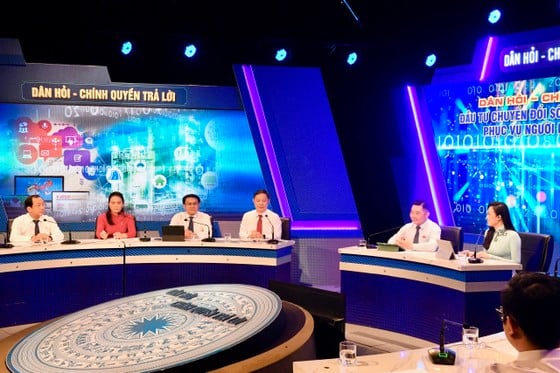 |
Leaders of the Ho Chi Minh City People's Committee and relevant departments respond to voters' opinions. Photo: VIET DUNG |
Speaking at the event, Vice Chairman of the Ho Chi Minh City People's Committee, Duong Anh Duc, said that Ho Chi Minh City considers digital transformation as one of its key tasks, setting development goals based on technology. In 2021, Ho Chi Minh City spent 0.78% of its budget on digital transformation, while this figure rose to 0.97% in 2022 and is projected to exceed 1% in 2023.
In addition, the Ho Chi Minh City People's Committee is focusing on directing the synchronized implementation of digital transformation. Specifically, the People's Committee has assigned the Department of Information and Communications to advise on and implement core digital transformation applications and services for synchronized deployment across the city's entire system. Ho Chi Minh City is also focusing on building and exploiting a shared database system.
Regarding voters' suggestions for developing an application to address citizens' complaints, the Vice Chairman of the Ho Chi Minh City People's Committee stated that the People's Committee has directed the Office of the People's Committee to plan the development of this software, to be completed in 2023. The software aims to resolve citizens' complaints in a thorough, transparent, and timely manner.
Regarding information on businesses participating in digital transformation, Vice Chairman of the Ho Chi Minh City People's Committee Duong Anh Duc stated that the People's Committee of Ho Chi Minh City has directed the Department of Information and Communications to develop a plan to establish a digital transformation center for the city. This center will act as a bridge, connecting and introducing businesses to the city's digital transformation needs. Ho Chi Minh City does not differentiate between large and small businesses; its focus is on the quality of the solutions offered. Therefore, Mr. Duong Anh Duc urged businesses to boldly present effective digital transformation solutions to the People's Committee of Ho Chi Minh City.
Furthermore, Comrade Duong Anh Duc also stated that Ho Chi Minh City is the only locality with an investment stimulus program. In the near future, when the National Assembly issues a Resolution replacing Resolution 54 on special mechanisms and policies for the development of Ho Chi Minh City, this program will be expanded. From there, the Ho Chi Minh City People's Committee will include businesses eligible for these policies, such as high-tech businesses and information technology businesses.
Accordingly, Comrade Duong Anh Duc suggested that relevant agencies introduce the preferential policies of Ho Chi Minh City to businesses with effective digital transformation solutions. At the same time, Ho Chi Minh City always hopes to attract social resources to accelerate the progress and quality of digital transformation services, serving the people even better.
Regarding the training of human resources for digital transformation, according to Vice Chairman of the Ho Chi Minh City People's Committee Duong Anh Duc, this is a task that Ho Chi Minh City has implemented from the very beginning in the process of implementing digital government. In 2022, Ho Chi Minh City trained over 1,000 officials to serve digital transformation. In addition, the Ministry of Information and Communications organized online training for commune-level officials on digital transformation. Ho Chi Minh City introduced more than 500 officials from communes, wards, and towns to participate in the program. In the near future, city departments and agencies will continue to have training programs for digital transformation officials in localities.
Based on feedback from voters and Ho Chi Minh City government leaders, Deputy Head of the Economic and Budget Committee of the Ho Chi Minh City People's Council, Le Truong Hai Hieu, proposed that the Ho Chi Minh City People's Committee and relevant departments and agencies continue to effectively implement the goals set out in the digital transformation program.
In particular, Representative Le Truong Hai Hieu proposed that the Ho Chi Minh City government should soon complete the city's data system, linking city data between sectors and citizen data in the form of a data hub, ensuring the security of citizens' data. At the same time, Representative Le Truong Hai Hieu suggested that the Ho Chi Minh City People's Committee invest in software, applications, and equipment to serve the people and businesses, and research the possibility of removing computers from the centralized procurement list. He also proposed reviewing the costs incurred and reducing travel time for citizens when using digital transformation services…
Deputy Director of Ho Chi Minh City Department of Health, Nguyen Anh Dung :
In 2019, the Department of Health advised the Ho Chi Minh City People's Committee to issue a plan for the implementation of electronic health records in Ho Chi Minh City for the period 2019-2025, with the goal of creating a database. Electronic health records not only allow citizens to self-manage and update their health information but also help healthcare facilities access and share information, supporting healthcare for the people.
The health sector is coordinating with the Department of Information and Communications to develop a technical plan to ensure that people's health data is "accurate, complete, clean, and relevant." The implementation of electronic health records for city residents is one of the key activities in the digital transformation of the health sector in 2023.
Deputy Director of the Ho Chi Minh City Department of Education and Training, Le Hoai Nam:
In 2023, the Department of Education and Training implemented a combined enrollment system for primary and secondary schools using identification codes to enhance convenience for parents in registering their children for preschool, grade 1, and grade 6.
Citizens can simply use their identification code to register for online enrollment from home. In addition, the department is also coordinating the deployment of GIS maps in the enrollment process to help allocate students to schools in the area more effectively.
Deputy Director of the Ho Chi Minh City Department of Transport, Bui Hoa An:
The Metro Line 1 is expected to become operational soon. The Ho Chi Minh City Department of Transport has introduced an electronic payment solution for public transport, allowing people to use a single card to pay for various types of public transportation.
Currently, the Department of Transport has implemented electronic payment on 23 bus routes. Based on the pilot results, the Department of Transport has submitted to the People's Committee for consideration and approval a technical standard framework for electronic payment in public passenger transport, aiming to connect and integrate with other public passenger transport modes such as buses, Metro, BRT, river buses, etc.
Source








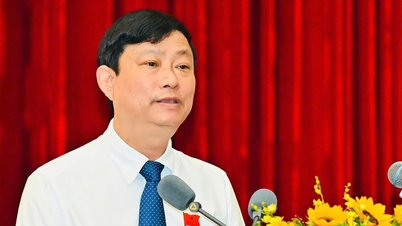
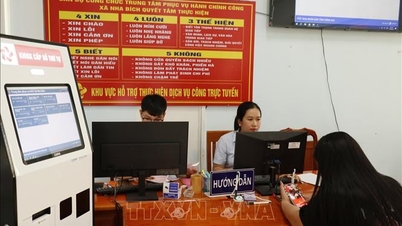

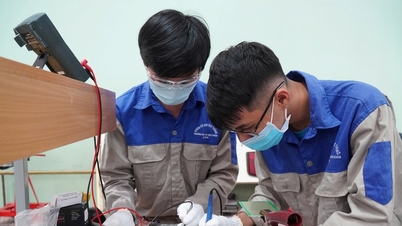




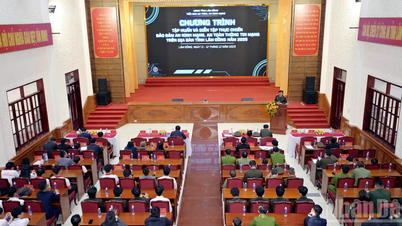



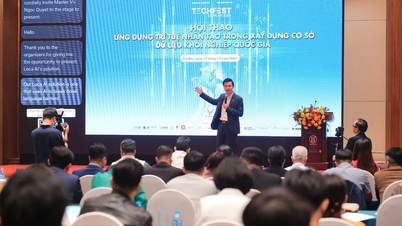



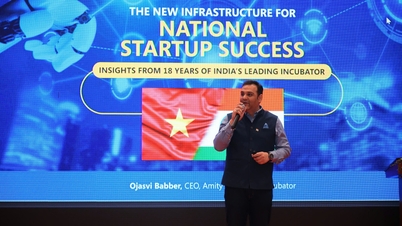




































































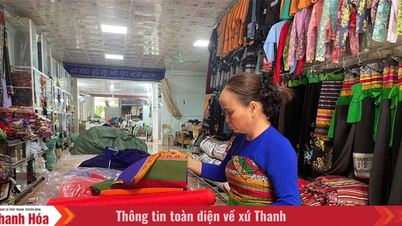

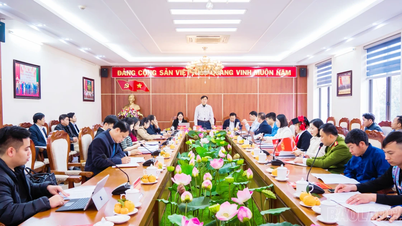













Comment (0)